US says not ready to resume nuclear talks with Iran under Pezeshkian
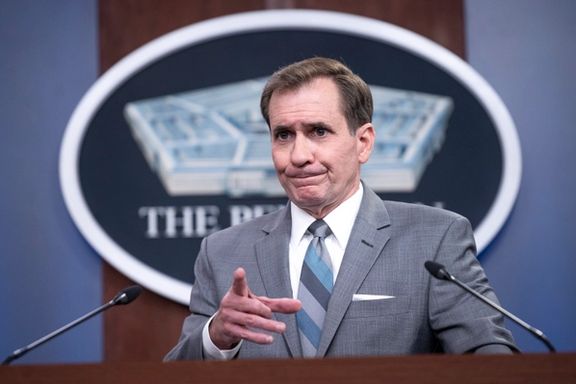
The Biden administration is not ready to resume nuclear talks with Iran under the new president, the White House national security council spokesman said Monday.

The Biden administration is not ready to resume nuclear talks with Iran under the new president, the White House national security council spokesman said Monday.
In his presidential campaign, Iran's president-elect Masoud Pezeshkian advocated engagement in constructive talks with Western powers to revive the 2015 nuclear deal (JCPOA) and to lift the sanctions that he says have crippled the Iranian economy since the withdrawal of the US from the agreement in 2018.
Asked whether Pezeshkian’s election will change the US negotiating position, the White House's John Kirby offered a blunt "no".
“They’re still supporting terrorist groups like Hamas and Hezbollah. They’re still supporting the Houthis as the Houthis attack ships in the Red Sea. They’re still attacking shipping as well. And they’re still supplying drones and drone technology and drone expertise to the Russians so that the Russians can continue to kill innocent Ukrainians like they did over the weekend,” Kirby told a press conference. “So no, no.”
He said Washington does not expect any change in Iran’s behavior after the election of Pezeshkian. “We’ll see what this guy wants to get done but we are not expecting any changes in Iranian behavior."
The US State Department earlier said that the Iranian elections will not have a major impact on the Biden administration's approach to Iran.
"The elections will not have a significant impact on our approach to Iran... Our concerns about Iran’s behavior are unchanged. At the same time, we remain committed to diplomacy when it advances American interests," a State Department spokesperson told Iran International.
While the Biden administration has tried to keep Pezeshkian at arm's length, the EU has welcomed his win, offering an olive branch to the Islamic Republic's new administration despite warnings by Iranian opposition figures and dissidents against any "appeasement" with Pezeshkian.
Nabila Massrali, the spokesperson for Foreign Affairs and Security Policy of the European Union, extended congratulations to Pezeshkian, saying the EU stands ready to engage with his administration.
"We are ready to engage with the new government in line with EU policy of critical engagement," Massrali tweeted on Saturday.
Several Iranian opposition figures have called on Western powers not to engage with the new government of Iran.
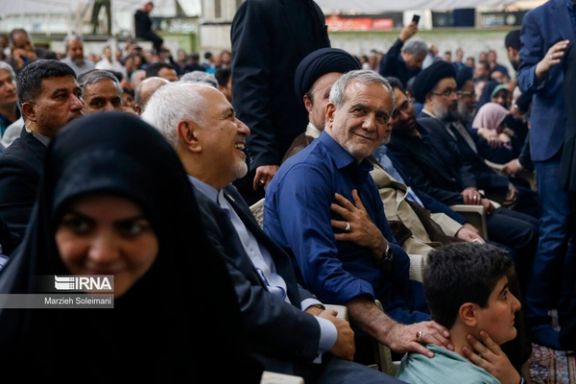
With Masoud Pezeshkian announced as the winner of Iran’s snap election, which followed the sudden death of President Ebrahim Raisi, uncertainties remain about when he will assume office and form the new government.
The inauguration of new presidents in the Islamic Republic typically occurs in early August, although no specific date is set. However, since there is currently no incumbent in office, there is some debate about when the new administration will officially begin.
The only timeframe that applies in case of the death of a president is 50 days until a new one should be elected. Raisi died in a helicopter crash on May 19, and the election was held on June 28 and the runoff on July 5.
There are several steps until the president-elect can be called Iran’s President.
After the election, the Guardian Council should confirm the validity of the results, ensuring that the election process followed legal precepts. Then, it issues a certificate of appointment for the president-elect. This document should be signed by the members of the Council and then sent to the Supreme Leader, who would announce the date for Tanfiz, when he officially endorses the election results and ratifies the new president. It is followed by Tahlif, or the swearing-in ceremony, which usually happens within a few days.
During the Tanfiz, Ali Khamenei hands over a decree, known as the "decree of confirmation" or "decree of validation", to the president-elect, formally recognizing him as the legitimate president. Without the Supreme Leader's approval, the president does not have the authority to assume office. During Tahlif, the newly elected president takes an oath before the Parliament (Majlis) in the presence of the head of the judiciary and the members of the Guardian Council, promising to uphold the constitution and faithfully execute his duties as the head of state. Both ceremonies are essential in the transition of presidential power, ensuring both legal and symbolic legitimacy for the incoming president.
Mojtaba Yousefi, a member of the parliament's presiding board, said this week the inauguration ceremony for Pezeshkian is scheduled for August 4 or 5. The president will then have 15 days to present his proposed ministers to the parliament for a vote of confidence, which is reportedly set to be held on September 5.
There is controversy about why the parliament, dominated by hardliners whose candidates lost to Pezeshkian, would not vote on the proposed cabinet sooner, given that fact that the country does not have a president and is run by interim Mohammad Mokhber, Raisi’s first vice president.
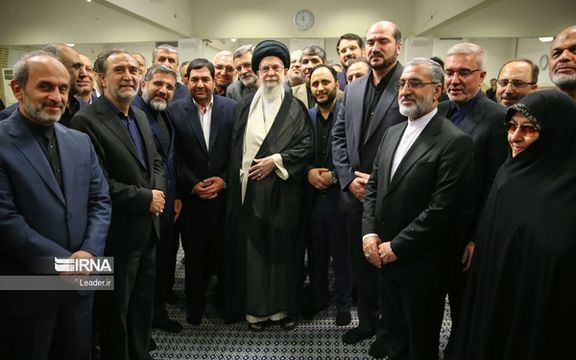
According to Abbas-Ali Kadkhodaei, the former spokesman of the Guardian Council, until the new government assumes office, members of the former cabinet can make decisions or appointments that could have financial implications for the next government.
This comes despite Mokhber’s directive in June that called on all executive bodies to “refrain from any changes to organizational structures, personnel reassignments, transfer of government property, implementation of new regulations, changes in tariffs and fees, and any actions outside the rules and regulations until the establishment of the fourteenth government.”
However, Kadkhodaei noted that unless there is a specific legal provision that states otherwise, the incumbent officials can make such decisions, implying that Mokhber’s directive may not be binding. “These are customary practices and have never been subject to legal debate,” he said.
Hossein Mirmohammad Sadeghi, a former lawmaker, said that there is no regulation for setting a date for the vote of confidence on the new cabinet, explaining that such dates are primarily based on considerations of different factors. These include the parliament's summer recess ending on July 21st and upcoming calendar events, like the observance of the Shiite mourning period, Ashura, on July 14th in Iran.
Hamid Aboutalebi, a former deputy chief of staff for political affairs of the office of Iran’s president under Hassan Rouhani, wrote a commentary on his X account on Monday, stressing the legal necessity of holding the endorsement ceremony as soon as possible. He said the president-elect should assume office by the 50th day after the death of the incumbent. He argued that according to the constitution, until the new government is formed, the parliament cannot impeach ministers or pass a vote of no confidence, leaving the body with no oversight capability in case of negligence or errors by the ministers.
Aboutalebi said this would present a serious constitutional challenge if the country would be without an incumbent president at the end of the 50-day period and would be governed by an unelected first vice president, with ministers who are not subject to parliamentary oversight.
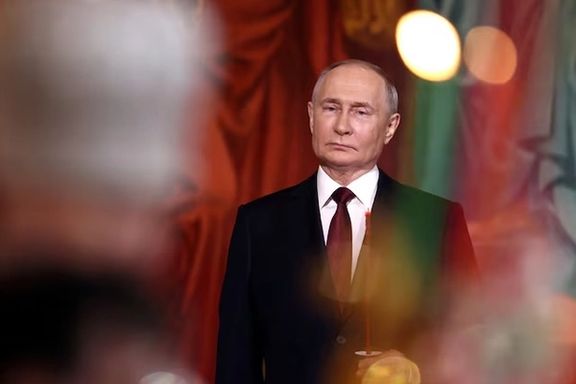
Russian President Vladimir Putin congratulated Masoud Pezeshkian on his election as the president-elect of Iran during a phone call on Monday.
According to ISNA, President Putin expressed his best wishes for Pezeshkian's success in his “significant responsibility ahead,” as well as “for the well-being and prosperity of the Iranian people.”
Pezeshkian was elected in a runoff on Friday, after a highly stage-managed electoral process following the death of President Ebrahim Raisi in a freak helicopter crash in May.
During the phone call, Putin noted that the relations between the Islamic Republic and Russia are at the highest level and expressed hope that these relations will continue during Pezeshkian's presidency.
Russia and Iran have strengthened their alliance in the past decade during the war in Syria where they both sent forces to rescue the government of Bashar al-Assad. Moscow has also sided with Tehran in its nuclear dispute with the West, condemning sanctions and continuing trade and financial relations. Iran in return has supplied Russia with hundreds of suicide drones that have been used against Ukrainian infrastructure and civilian targets.
Russia, which is also under Western sanctions, can offer Iran more military technology, but trade between the two allies has remained limited to less than $5 billion per year. In fact, both economies are heavily dependent on oil exports and they both compete for illicit shipments to China.
Putin also highlighted the expanding cooperation between Iran and Russia, particularly in the energy and transportation sectors. He invited Pezeshkian to attend the upcoming BRICS summit in Kazan and emphasized Russia's readiness to sign a comprehensive cooperation agreement between the two countries on the sidelines of the summit. The agreement is a new version of a previous accord signed in 2001.
According to ISNA, Pezeshkian expressed his gratitude for Putin's warm and friendly congratulations, stating, "We place great importance on our relations with the friendly and neighboring country of Russia, and we will undoubtedly strengthen these relations."
The president-elect emphasized the new government's commitment to pursuing and implementing the agreements made during the late President Raisi's administration.
Pezeshkian also highlighted the importance of cooperation between the two countries in international and regional organizations and alliances such as the Shanghai Cooperation Organization, BRICS, and Eurasia. He noted that the comprehensive cooperation agreement between Iran and Russia has been finalized and is ready to be signed on the sidelines of the BRICS summit in Russia.
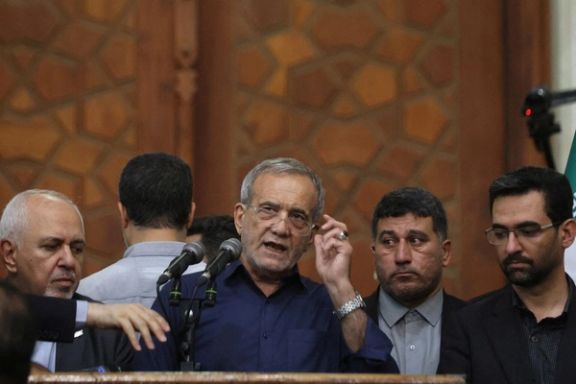
Iran’s president-elect Massoud Pezeshkian has responded to a congratulatory message from Hezbollah leader Hassan Nasrallah, pledging continued support to “resistance force” aligned with Tehran in the region.
“The Islamic Republic of Iran has always supported the resistance of the people in the region against the illegitimate Zionist regime. Supporting the resistance is rooted in the fundamental policies of the Islamic Republic of Iran, the ideals of the late Imam Khomeini, and the guidance of the Supreme Leader, and will continue with strength,” Pezeshkian wrote.
Pezeshkian won the election last Friday, campaigning as a "reformist," despite previously characterizing himself as a "principlist," a term in the Islamic Republic jargon meaning someone dedicated to the principles of the Islamic revolution.
From its inception in 1979, the Islamic government in Iran has been a staunch enemy of Israel and the United States. It established the Lebanese Hezbollah in the early 1980s as a proxy force to confront Israel. In the past two decades it has created other proxy forces in Iraq, Syria, Yemen and Palestinian territories. It also has networks in other Middle Eastern, African and Western countries.
Iranian have protested against the government's financial and military assistance to these groups as a waste of national resources. The slogan, "Neither Gaza nor Lebanon, my life for Iran" has been a familiar chant during anti-government protests in recent years. As Tehran has committed more resources, its own economic situation has worsened, driving million of people into poverty.
Pezeshkian went on to tell Nasrallah, “I am confident that the resistance movements in the region will not allow this regime [Israel] to continue its warmongering and criminal policies against the oppressed people of Palestine and other nations in the region.”
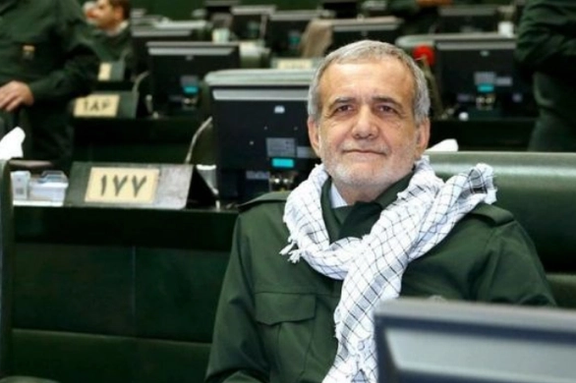
Immediately following Masoud Pezeshkian's victory over Saeed Jalili in Iran’s heavily manipulated presidential election, most Western media outlets and news agencies labeled him as a “reformist” and “moderate.”
The media also described Jalili as a “hardliner,” “conservative,” or “ultraconservative.”
But do these labels, often used to dramatize politics and create a "devil and angel" narrative, accurately describe these two individuals and their supporters? Many Iran observers would say no.
Like Jalili, Pezeshkian announced during the campaigns that he fully adheres to the Supreme Leader, Ali Khamenei’s, policies and has "melted into Khamenei’s leadership."
To most, there is no doubt that both of them are staunch Islamists.
On certain issues, it would appear challenging to portray Pezeshkian as a libertarian and individualist politician who respects individual rights.
First, considering the “reformist” label: Pezeshkian has neither claimed to be a reformist nor been a member of reformist parties or groups in the last three decades.
During the debates, he referred to himself as a "principlist reformist," which was seen by many as merely spin.
Pezeshkian was a minister in former President Mohammad Khatami's cabinet two decades ago, but that was a multi-party and multi-sectarian government, including participants from across the political spectrum.
Pezeshkian’s membership in Khatami's administration, can therefore not be seen as evidence that he is a reformist.
Additionally, during the campaigns, he did not mention any of the reformist programs and policies from the Khatami era, such as media freedom, increasing the power of elected institutions compared to appointed ones, empowering civil society institutions, and canceling the Guardian Council’s power to disqualify candidates.
And, when it comes to being a “moderate”, Pezeshkian’s track record has shown that he is no different from Jalili and the other candidates.
He has been a strong advocate of compulsory hijab and cancel culture, even stating that he enforced these policies in a hospital and university under his management right after the 1979 Islamic takeover, before they were mandated. His complaints about officials being harsh on women are inconsistent with his voting record for laws restricting women's rights during his tenure in the parliament (Majles).
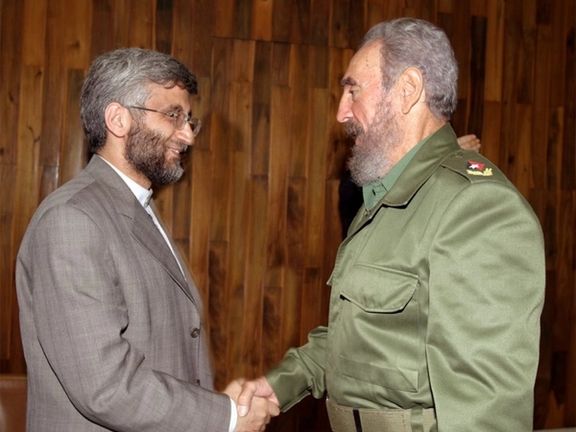
Another issue discussed in the 2024 election was internet filtering. During the debates, Pezeshkian repeatedly defended shutting down the internet, as was done for a week during the repressions of November 2019, and filtering social networks in the context of public protests. Security forces killed at least 1,500 civilians during that week, as the government shut off the Internet to prevent news of the atrocities reaching the outside world.
In the case of the murder of Iranian-Canadian journalist Zahra Kazemi in 2003 while she was in custody in Evin prison, Pezeshkian, as an investigating physician, did not describe her death as unusual. This was despite the fact that her body was buried without her family's knowledge, and her grave was completely cemented to prevent an autopsy and subsequent investigations.
To many, Pezeshkian is as conservative as Jalili and cannot be portrayed as a liberal or libertarian.
In the Iranian context, being conservative or ultra-conservative typically means believing in Sharia law and implementing its verdicts in society using the government’s coercive power.
During the Khatami and Hassan Rouhani administrations, Western media also described these two leaders, who were Islamists committed to implementing Sharia law like Khomeini, as liberal and moderate, thereby misleading their readers.
Khatami and Rouhani sought de-escalation with the West to preserve the Islamic system and implement Sharia laws within it; for this reason, they can be considered non-anti-Western. However, in their stance on erasing Israel off the map, anti-Semitism, anti-Bahá'íism, negating the rights of the LGBT community, limiting women's rights, and denying social and cultural freedoms, they believed and acted like the founder of the Islamic Republic.
For this reason, using the term "liberal" to describe them or their administrations could be considered a form of deception of Western public opinion.
Given the context and political background of Muslim-majority societies, particularly those with Islamists in power like Iran and Afghanistan, using labels such as left and right, conservative and liberal, and moderate and radical can be misleading and problematic.
Labeling high-ranking officials, whose government engages in torturing opponents, imprisoning writers and journalists, violating the basic rights of Jews and Christians, and supporting the killing of street protesters, as "liberal" or "moderate" misrepresents their actions and undermines the experiences of victims of totalitarian regimes.
Pezeshkian's political, social, and cultural positions are closely aligned with those of Hassan Nasrallah, the leader of Lebanon's Hezbollah; otherwise, he would be rejected by the Guardian Council.
The new president aligns himself closely with Hezbollahi principles – some might even call him a Hezbollahi personified.
If one considers Hassan Nasrallah and Hezbollah to be moderate and reformist, the same descriptors could be applied to Pezeshkian.
This alignment is further evidenced by Nasrallah's congratulatory message to Pezeshkian: "We are by your side and, God willing, we will continue this way until we reach the final victory, the axis of which is the mighty, dear, and powerful Iran."
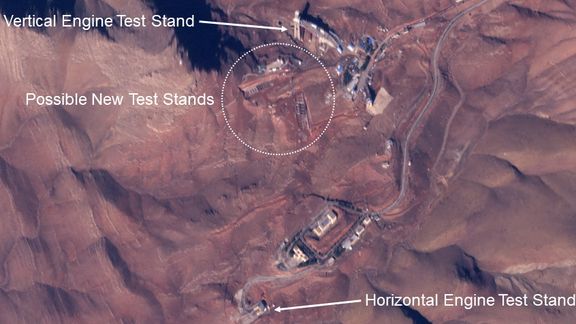
Recent satellite imagery shows major expansions at two key Iranian ballistic missile facilities that two American researchers assessed are for boosting missile production, a conclusion confirmed by three senior Iranian officials.
The enlargement of the sites follows an October 2022 deal in which Iran agreed to provide missiles to Russia, which has been seeking them for its war against Ukraine. Tehran also supplies missiles to Yemen's Houthi rebels and the Lebanese militia Hezbollah, both members of the Iran-backed Axis of Resistance against Israel, according to US officials.
Images taken by commercial satellite firm Planet Labs of the Modarres military base in March and the Khojir missile production complex in April show more than 30 new buildings at the two sites, both of which are located near Tehran.
The images, reviewed by Reuters, show many of the structures are surrounded by large dirt berms. Such earthworks are associated with missile production and are designed to stop a blast in one building from detonating highly combustible materials in nearby structures, said Jeffrey Lewis of the Middlebury Institute of International Studies at Monterey.

The expansions began at Khojir in August last year and at Modarres in October, Lewis said, based on images of the sites.
Iran's arsenal is already the largest in the Middle East, estimated at more than 3,000 missiles, including models designed to carry conventional and nuclear warheads, experts say.
Three Iranian officials, who asked not to be identified because they were not authorized to speak publicly, confirmed that Modarres and Khojir are being expanded to boost production of conventional ballistic missiles.
"Why shouldn't we?" said one official.
A second Iranian official said some of the new buildings would also allow a doubling of drone manufacturing. Drones and missile components would be sold to Russia, drones would be provided to the Houthis and missiles to Hezbollah, the source added.
Reuters was unable independently to confirm the Iranian officials' comments.
Iran's mission to the United Nations did not respond to a Reuters request for comment on the expansion of the complexes. Tehran has previously denied providing drones and missiles to Russia and the Houthis. Hezbollah's media office did not immediately respond to requests for comment.

Houthi spokesperson Mohammed Abdulsalam said a boost in Iran's weapons manufacturing would not have any impact in Yemen because the Houthis develop and manufacture aircraft independent of Iran.
Lewis analyzed the Planet Labs imagery with Decker Eveleth, an associate research analyst at CNA, a Washington thinktank, as part of a Middlebury project that monitors Iranian missile infrastructure.
"We know that Russia is on the hunt for low-cost missile capabilities, and it has gone to Iran and North Korea," said Lewis.
Moscow and Pyongyang have denied the transfer of North Korean missiles to Russia. The Russian embassy in Washington and North Korea's mission to the United Nations did not immediately respond to requests for comment for this story.
The two U.S. researchers said in separate interviews that it was not clear from the photos what kinds of missiles would be produced at the new facilities, which still appeared to be under construction.
Any increase in Tehran's missile or drone production would be concerning to the United States, which has said that Iranian drones help sustain Russia's assault on Ukrainian cities, and to Israel as it fends off attacks from Iran-backed groups, including Hezbollah.
The US Office of the Director of National Intelligence declined to comment on the reseachers' analysis.
A U.S. National Security Council spokesperson declined to confirm their assessment, adding that the United States has implemented various measures, including sanctions, intended to constrain Iranian missile and drone production and exports.
Reuters in February reported that Iran had sent surface-to-surface ballistic missiles to Russia for use against Ukraine. Iran denied providing the weapons. Washington said it could not confirm the transfers but it assumed Tehran intended to provide missiles to Moscow.
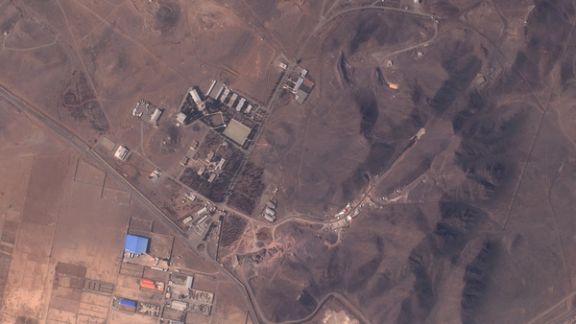
New buildings, dirt berms
Shahid Modarres and Khojir are overseen by the Islamic Revolutionary Guard Corps (IRGC), the elite paramilitary organization that plays a central role in Iran's missile and nuclear programs. It controls large segments of the Iranian economy and answers directly to Iran’s Supreme Leader Ali Khamenei.
The complexes have long been associated with the development and production of Iran's short- and medium-range ballistic missiles and rockets for the country's space program.
On November 12, 2011, a massive explosion destroyed a large swath of Shadid Modarres associated with solid fuel missiles, killing 17 IRGC officers. They included Gen. Hassan Moqaddam, regarded by Iran as the "architect" of its ballistic missile program.
Construction at Shahid Modarres, which began again after the 2011 explosion, accelerated last year, the second Iranian official said.
"I think the Iranians may have chosen not to berm the buildings (before the explosion) because they didn’t want to draw attention to them," said Lewis. "They learned the hard way."
Eveleth and Lewis said the sites' long history with Iran's missile program – Shahid Modarres is considered by some experts as its birthplace - and the numerous dirt berms support their assessment that Tehran is expanding ballistic missile production.
"When we see where you basically have an entire production line that is bermed like that, that's usually missiles," said Eveleth.
(Report by Reuters)